The Cambridge History of China. Vol. 12: Republican China, 1912-1949, Part 1
Подождите немного. Документ загружается.

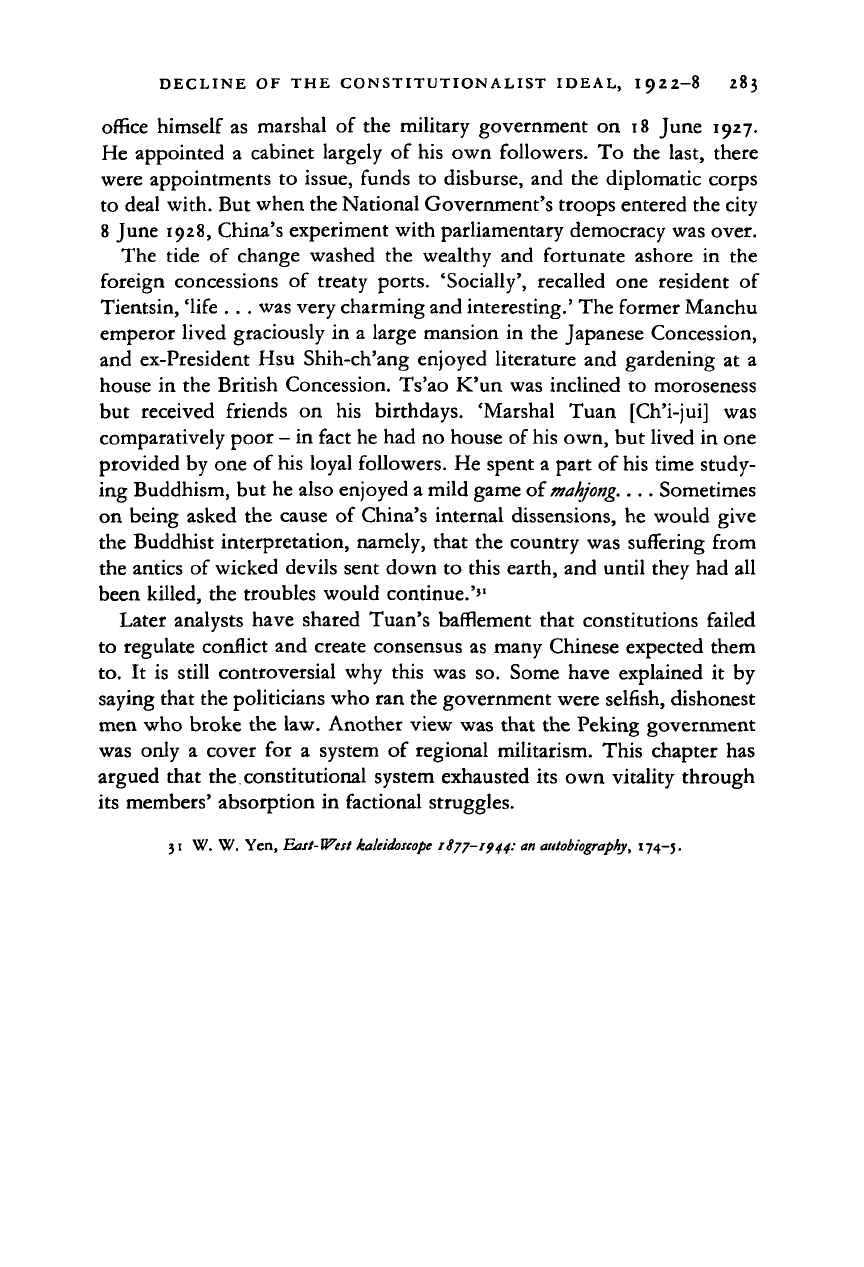
DECLINE OF THE CONSTITUTIONALIST IDEAL, I 9 2 2-8 283
office himself
as
marshal
of the
military government
on 18
June
1927.
He appointed
a
cabinet largely
of
his
own
followers.
To the
last, there
were appointments
to
issue, funds
to
disburse,
and the
diplomatic corps
to deal with. But when the National Government's troops entered the city
8 June 1928, China's experiment with parliamentary democracy was over.
The tide
of
change washed
the
wealthy
and
fortunate ashore
in the
foreign concessions
of
treaty ports. 'Socially', recalled
one
resident
of
Tientsin, 'life
. . .
was very charming and interesting.' The former Manchu
emperor lived graciously
in a
large mansion
in the
Japanese Concession,
and ex-President
Hsu
Shih-ch'ang enjoyed literature
and
gardening
at a
house
in the
British Concession. Ts'ao
K'un
was inclined
to
moroseness
but received friends
on his
birthdays. 'Marshal Tuan [Ch'i-jui]
was
comparatively poor
- in
fact
he
had
no
house
of
his own,
but
lived
in
one
provided
by
one
of
his loyal followers.
He
spent
a
part
of
his time study-
ing Buddhism,
but
he also enjoyed
a
mild game oimahjong..
..
Sometimes
on being asked
the
cause
of
China's internal dissensions,
he
would give
the Buddhist interpretation, namely, that
the
country was suffering from
the antics
of
wicked devils sent down
to
this earth,
and
until they
had all
been killed,
the
troubles would continue.''
1
Later analysts have shared Tuan's bafflement that constitutions failed
to regulate conflict
and
create consensus
as
many Chinese expected them
to.
It is
still controversial
why
this
was so.
Some have explained
it by
saying that the politicians who ran the government were selfish, dishonest
men who broke
the
law. Another view was that
the
Peking government
was only
a
cover
for a
system
of
regional militarism. This chapter
has
argued that the.constitutional system exhausted
its own
vitality through
its members' absorption
in
factional struggles.
31
W. W.
Yen, E/ist-West
kaleidoscope
1877-1944: an
autobiography,
174-5-
Cambridge Histories Online © Cambridge University Press, 2008
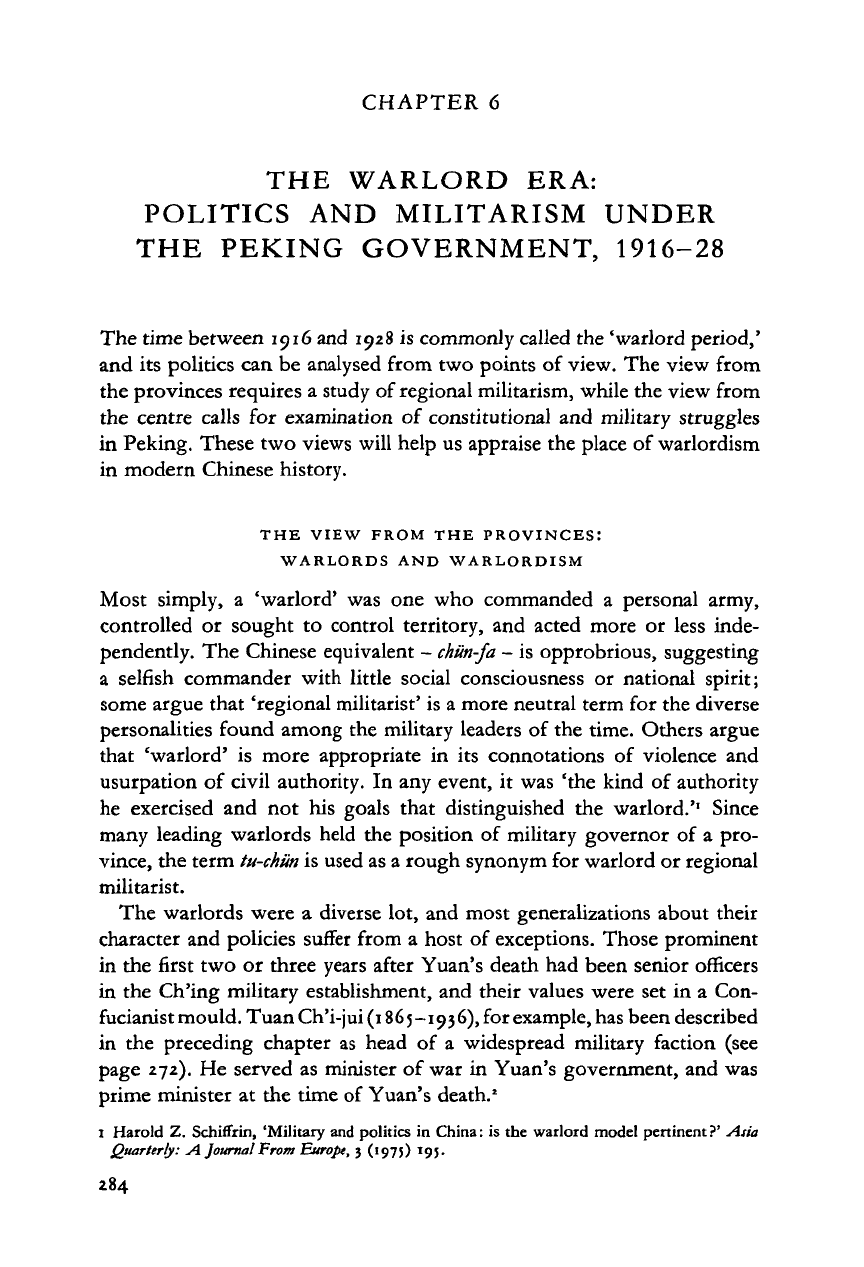
CHAPTER
6
THE WARLORD
ERA:
POLITICS
AND
MILITARISM UNDER
THE PEKING GOVERNMENT, 1916-28
The time between 1916 and 1928
is
commonly called the 'warlord period,'
and
its
politics
can be
analysed from two points
of
view. The view from
the provinces requires
a
study
of
regional militarism, while the view from
the centre calls
for
examination
of
constitutional
and
military struggles
in Peking. These two views will help
us
appraise the place
of
warlordism
in modern Chinese history.
THE VIEW FROM THE PROVINCES:
WARLORDS AND WARLORDISM
Most simply,
a
'warlord'
was one who
commanded
a
personal army,
controlled
or
sought
to
control territory,
and
acted more
or
less inde-
pendently.
The
Chinese equivalent
-
chiin-fa
- is
opprobrious, suggesting
a selfish commander with little social consciousness
or
national spirit;
some argue that 'regional militarist'
is a
more neutral term
for
the diverse
personalities found among
the
military leaders
of
the time. Others argue
that 'warlord'
is
more appropriate
in its
connotations
of
violence
and
usurpation
of
civil authority.
In any
event,
it
was
'the
kind
of
authority
he exercised
and not his
goals that distinguished
the
warlord.'
1
Since
many leading warlords held
the
position
of
military governor
of a pro-
vince, the term
tu-chiin
is
used as a rough synonym
for
warlord
or
regional
militarist.
The warlords were
a
diverse
lot, and
most generalizations about their
character
and
policies suffer from
a
host
of
exceptions. Those prominent
in
the
first
two or
three years after Yuan's death
had
been senior officers
in
the
Ch'ing military establishment,
and
their values were
set in a Con-
fucianist mould. TuanCh'i-jui(i
865-1936),
for
example,
has been described
in
the
preceding chapter
as
head
of a
widespread military faction
(see
page 272).
He
served
as
minister
of
war
in
Yuan's government,
and was
prime minister
at the
time
of
Yuan's death.
2
1 Harold
Z.
Schiffrin, 'Military and politics
in
China:
is the
warlord model pertinent
?'
Atia
Quarterly:
A
Journal
From
Europt,
3
(1975)
195.
284
Cambridge Histories Online © Cambridge University Press, 2008
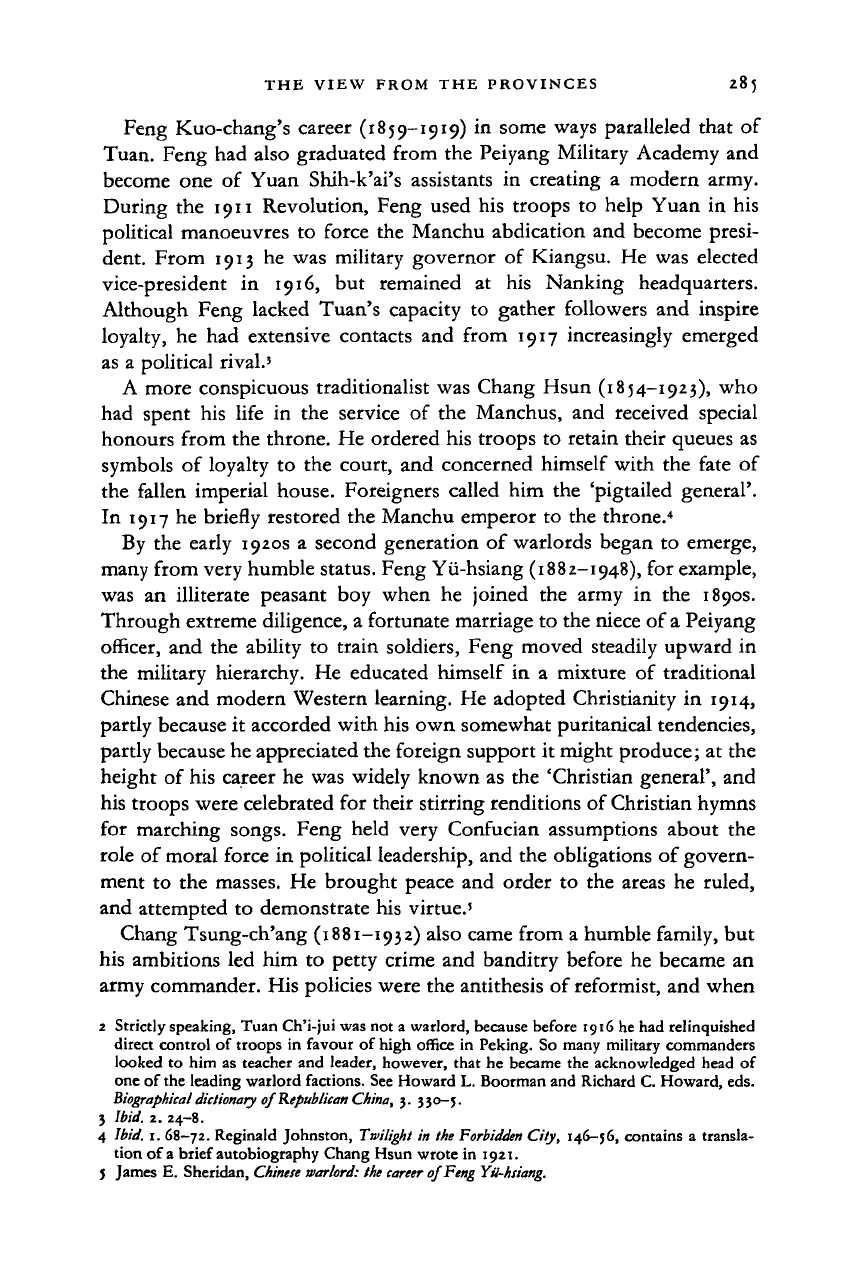
THE VIEW FROM
THE
PROVINCES
285
Feng Kuo-chang's career (185 9-1919)
in
some ways paralleled that
of
Tuan. Feng
had
also graduated from
the
Peiyang Military Academy
and
become
one of
Yuan Shih-k'ai's assistants
in
creating
a
modern army.
During
the 1911
Revolution, Feng used
his
troops
to
help Yuan
in his
political manoeuvres
to
force
the
Manchu abdication
and
become presi-
dent. From
1913 he was
military governor
of
Kiangsu.
He was
elected
vice-president
in 1916, but
remained
at his
Nanking headquarters.
Although Feng lacked Tuan's capacity
to
gather followers
and
inspire
loyalty,
he had
extensive contacts
and
from
1917
increasingly emerged
as
a
political rival.'
A more conspicuous traditionalist
was
Chang Hsun (1854-1923),
who
had spent
his
life
in the
service
of the
Manchus,
and
received special
honours from
the
throne.
He
ordered
his
troops
to
retain their queues
as
symbols
of
loyalty
to the
court,
and
concerned himself with
the
fate
of
the fallen imperial house. Foreigners called
him the
'pigtailed general'.
In
1917 he
briefly restored
the
Manchu emperor
to the
throne.
4
By
the
early 1920s
a
second generation
of
warlords began
to
emerge,
many from very humble status. Feng Yii-hsiang (1882-1948),
for
example,
was
an
illiterate peasant
boy
when
he
joined
the
army
in the
1890s.
Through extreme diligence,
a
fortunate marriage
to the
niece
of
a Peiyang
officer,
and the
ability
to
train soldiers, Feng moved steadily upward
in
the military hierarchy.
He
educated himself
in a
mixture
of
traditional
Chinese
and
modern Western learning.
He
adopted Christianity
in 1914,
partly because
it
accorded with
his own
somewhat puritanical tendencies,
partly because
he
appreciated
the
foreign support
it
might produce;
at the
height
of his
career
he was
widely known
as the
'Christian general',
and
his troops were celebrated
for
their stirring renditions
of
Christian hymns
for marching songs. Feng held very Confucian assumptions about
the
role
of
moral force
in
political leadership,
and the
obligations
of
govern-
ment
to the
masses.
He
brought peace
and
order
to the
areas
he
ruled,
and attempted
to
demonstrate
his
virtue.'
Chang Tsung-ch'ang (1881-1932) also came from
a
humble family,
but
his ambitions
led him to
petty crime
and
banditry before
he
became
an
army commander.
His
policies were
the
antithesis
of
reformist,
and
when
2 Strictly speaking, Tuan Ch'i-jui
was not a
warlord, because before 1916
he had
relinquished
direct control
of
troops
in
favour
of
high office
in
Peking.
So
many military commanders
looked
to him as
teacher
and
leader, however, that
he
became
the
acknowledged head
of
one
of
the leading warlord factions.
See
Howard
L.
Boorman
and
Richard
C.
Howard,
eds.
Biographical dictionary
of
Republican
China,
5.
330-5.
3
Ibid. 2. 24-8.
4
Ibid. 1.
68—72. Reginald Johnston, Twilight
in the
Forbidden
City, 146-56, contains
a
transla-
tion
of a
brief autobiography Chang Hsun wrote
in 1921.
5 James
E.
Sheridan,
Chinese
warlord:
the
career
of Feng Yii-hsiang.
Cambridge Histories Online © Cambridge University Press, 2008
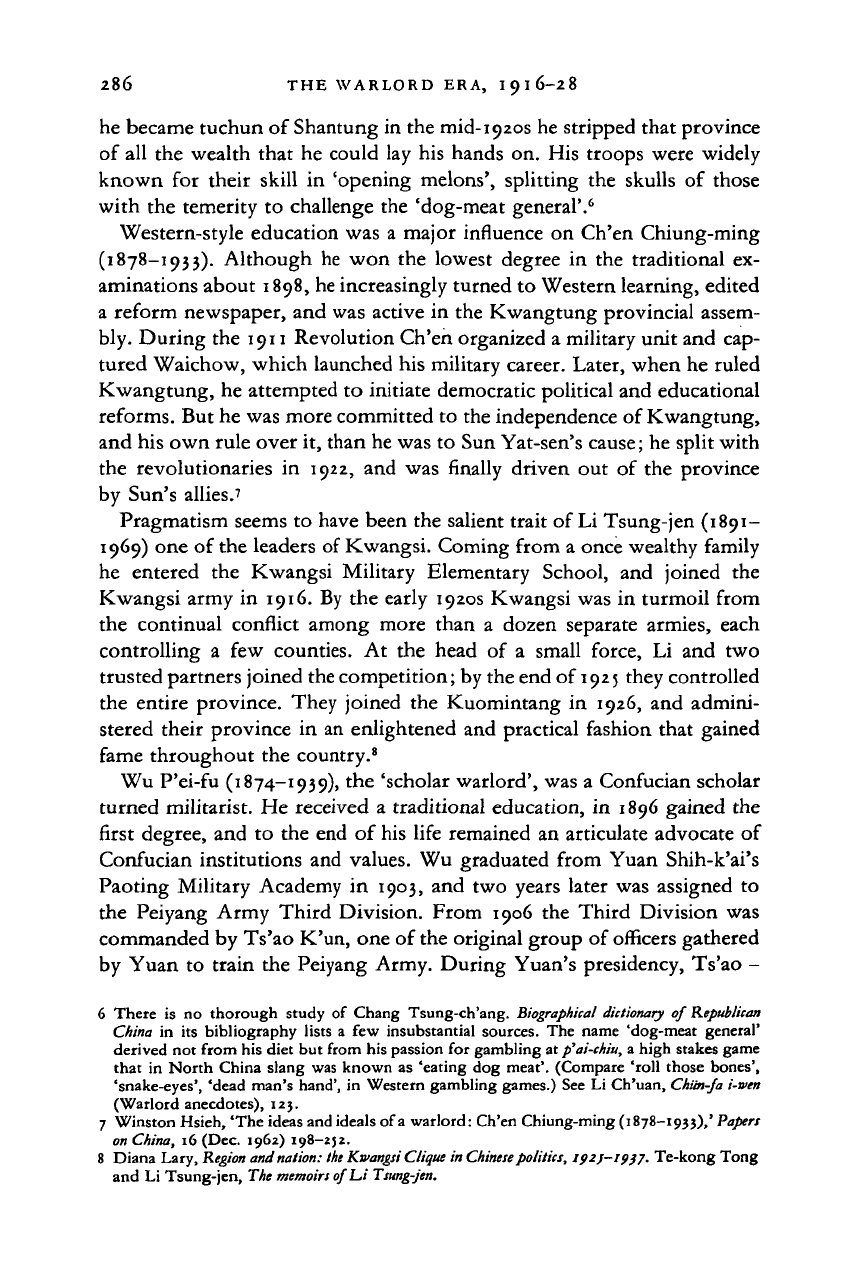
286 THE WARLORD ERA, I 9 I 6-2 8
he became tuchun of Shantung in the mid-i92os he stripped that province
of all the wealth that he could lay his hands on. His troops were widely
known for their skill in 'opening melons', splitting the skulls of those
with the temerity to challenge the 'dog-meat general'.
6
Western-style education was a major influence on Ch'en Chiung-ming
(1878-1933). Although he won the lowest degree in the traditional ex-
aminations about 1898, he increasingly turned to Western learning, edited
a reform newspaper, and was active in the Kwangtung provincial assem-
bly. During the 1911 Revolution Ch'en organized a military unit and cap-
tured Waichow, which launched his military career. Later, when he ruled
Kwangtung, he attempted to initiate democratic political and educational
reforms. But he was more committed to the independence of Kwangtung,
and his own rule over it, than he was to Sun Yat-sen's cause; he split with
the revolutionaries in 1922, and was finally driven out of the province
by Sun's allies.
7
Pragmatism seems to have been the salient trait of Li Tsung-jen
(1891-
1969) one of the leaders of Kwangsi. Coming from a once wealthy family
he entered the Kwangsi Military Elementary School, and joined the
Kwangsi army in 1916. By the early 1920s Kwangsi was in turmoil from
the continual conflict among more than a dozen separate armies, each
controlling a few counties. At the head of a small force, Li and two
trusted partners joined the competition; by the end of
1925
they controlled
the entire province. They joined the Kuomintang in 1926, and admini-
stered their province in an enlightened and practical fashion that gained
fame throughout the country.
8
Wu P'ei-fu (1874-1939), the 'scholar warlord', was a Confucian scholar
turned militarist. He received a traditional education, in 1896 gained the
first degree, and to the end of his life remained an articulate advocate of
Confucian institutions and values. Wu graduated from Yuan Shih-k'ai's
Paoting Military Academy in 1903, and two years later was assigned to
the Peiyang Army Third Division. From 1906 the Third Division was
commanded by Ts'ao K'un, one of the original group of officers gathered
by Yuan to train the Peiyang Army. During Yuan's presidency, Ts'ao -
6 There is no thorough study of Chang Tsung-ch'ang.
Biographical dictionary
of
Republican
China in its bibliography lists a few insubstantial sources. The name 'dog-meat general'
derived not from his diet but from his passion for gambling at
p'ai-chiu,
a high stakes game
that in North China slang was known as 'eating dog meat". (Compare 'roll those bones',
'snake-eyes', 'dead man's hand', in Western gambling games.) See Li Ch'uan,
Chiin-ja
i-wen
(Warlord anecdotes), 123.
7 Winston Hsieh, 'The ideas and ideals of a warlord: Ch'en Chiung-ming (1878-1933),' Papers
on
China, 16 (Dec. 1962) 198—252.
8 Diana Lary,
Region
and
nation:
the Kwangsi Clique
in Chinese politics, tf2j-i^)y. Te-kong Tong
and Li Tsung-jen, The
memoirs
of L,i
Tsung-jen.
Cambridge Histories Online © Cambridge University Press, 2008
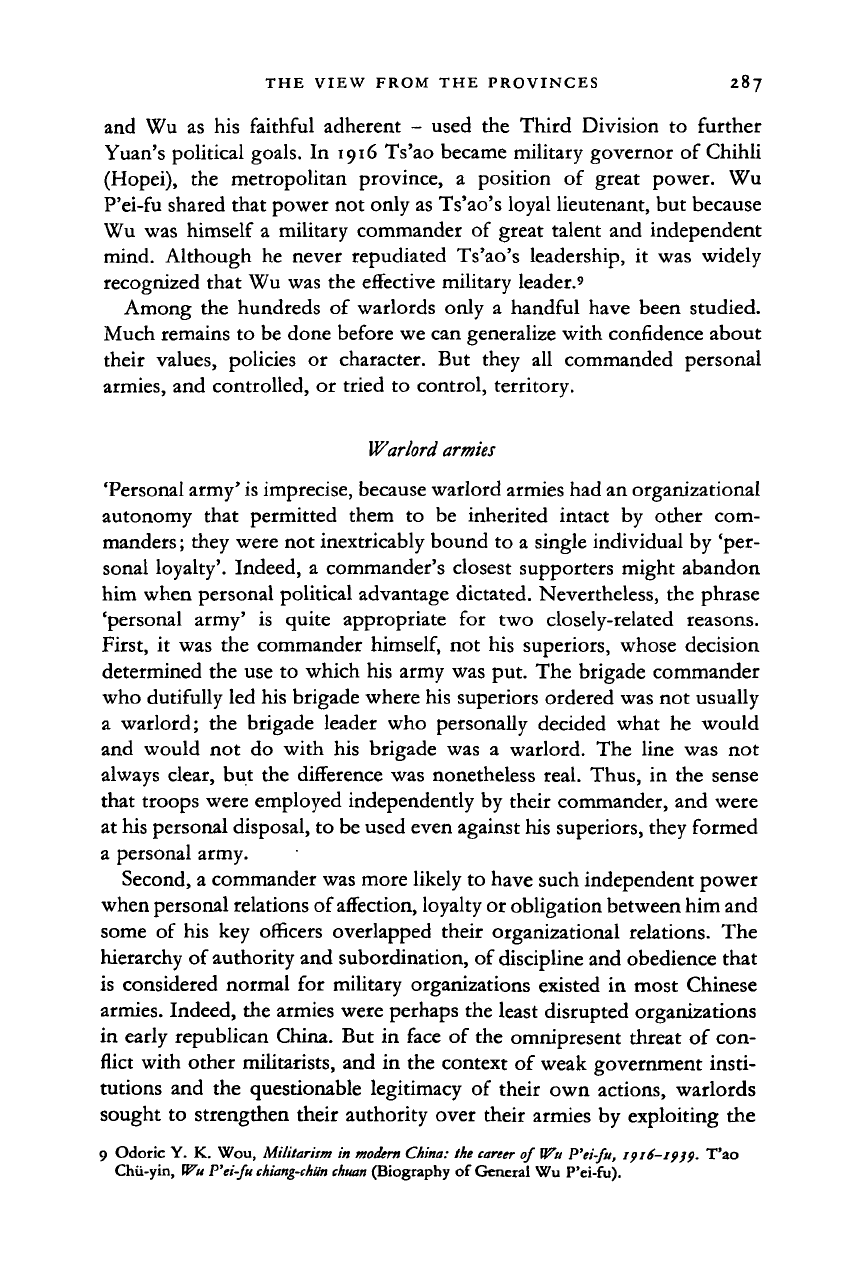
THE VIEW FROM THE PROVINCES 287
and Wu as his faithful adherent - used the Third Division to further
Yuan's political goals. In 1916 Ts'ao became military governor of Chihli
(Hopei), the metropolitan province, a position of great power. Wu
P'ei-fu shared that power not only as Ts'ao's loyal lieutenant, but because
Wu was himself a military commander of great talent and independent
mind. Although he never repudiated Ts'ao's leadership, it was widely
recognized that Wu was the effective military leader.
9
Among the hundreds of warlords only a handful have been studied.
Much remains to be done before we can generalize with confidence about
their values, policies or character. But they all commanded personal
armies, and controlled, or tried to control, territory.
Warlord armies
'Personal army' is imprecise, because warlord armies had an organizational
autonomy that permitted them to be inherited intact by other com-
manders
;
they were not inextricably bound to a single individual by 'per-
sonal loyalty'. Indeed, a commander's closest supporters might abandon
him when personal political advantage dictated. Nevertheless, the phrase
'personal army' is quite appropriate for two closely-related reasons.
First, it was the commander
himself,
not his superiors, whose decision
determined the use to which his army was put. The brigade commander
who dutifully led his brigade where his superiors ordered was not usually
a warlord; the brigade leader who personally decided what he would
and would not do with his brigade was a warlord. The line was not
always clear, but the difference was nonetheless real. Thus, in the sense
that troops were employed independently by their commander, and were
at his personal disposal, to be used even against his superiors, they formed
a personal army.
Second, a commander was more likely to have such independent power
when personal relations of affection, loyalty or obligation between him and
some of his key officers overlapped their organizational relations. The
hierarchy of authority and subordination, of discipline and obedience that
is considered normal for military organizations existed in most Chinese
armies. Indeed, the armies were perhaps the least disrupted organizations
in early republican China. But in face of the omnipresent threat of con-
flict with other militarists, and in the context of weak government insti-
tutions and the questionable legitimacy of their own actions, warlords
sought to strengthen their authority over their armies by exploiting the
9 Odoric Y. K. Wou, Militarism in
modern
China:
the
career
of
VPu
P'ei-fu,
iyi6-if)f.
T'ao
Chii-yin, Wu P'ei-fu
chiang-chun chuan
(Biography of General Wu P'ei-fu).
Cambridge Histories Online © Cambridge University Press, 2008
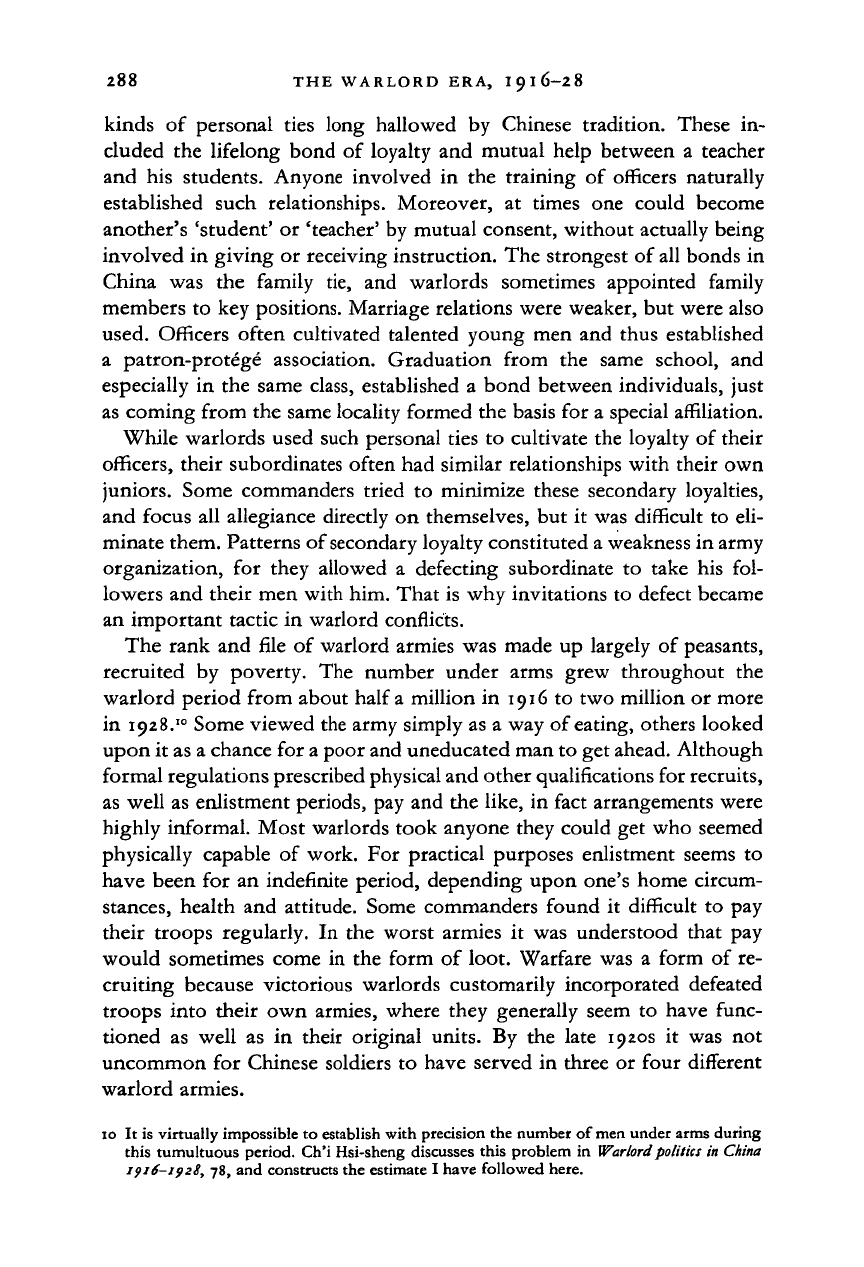
288 THE
WARLORD
ERA, I 9 I 6-2 8
kinds of personal ties long hallowed by Chinese tradition. These in-
cluded the lifelong bond of loyalty and mutual help between a teacher
and his students. Anyone involved in the training of officers naturally
established such relationships. Moreover, at times one could become
another's 'student' or 'teacher' by mutual consent, without actually being
involved in giving or receiving instruction. The strongest of all bonds in
China was the family tie, and warlords sometimes appointed family
members to key positions. Marriage relations were weaker, but were also
used. Officers often cultivated talented young men and thus established
a patron-protege association. Graduation from the same school, and
especially in the same class, established a bond between individuals, just
as coming from the same locality formed the basis for a special affiliation.
While warlords used such personal ties to cultivate the loyalty of their
officers, their subordinates often had similar relationships with their own
juniors. Some commanders tried to minimize these secondary loyalties,
and focus all allegiance directly on themselves, but it was difficult to eli-
minate them. Patterns of secondary loyalty constituted a weakness in army
organization, for they allowed a defecting subordinate to take his fol-
lowers and their men with him. That is why invitations to defect became
an important tactic in warlord conflicts.
The rank and file of warlord armies was made up largely of peasants,
recruited by poverty. The number under arms grew throughout the
warlord period from about half a million in 1916 to two million or more
in 1928.'° Some viewed the army simply as a way of eating, others looked
upon it as a chance for a poor and uneducated man to get ahead. Although
formal regulations prescribed physical and other qualifications for recruits,
as well as enlistment periods, pay and the like, in fact arrangements were
highly informal. Most warlords took anyone they could get who seemed
physically capable of work. For practical purposes enlistment seems to
have been for an indefinite period, depending upon one's home circum-
stances, health and attitude. Some commanders found it difficult to pay
their troops regularly. In the worst armies it was understood that pay
would sometimes come in the form of loot. Warfare was a form of re-
cruiting because victorious warlords customarily incorporated defeated
troops into their own armies, where they generally seem to have func-
tioned as well as in their original units. By the late 1920s it was not
uncommon for Chinese soldiers to have served in three or four different
warlord armies.
10 It is virtually impossible to establish with precision the number of men under arms during
this tumultuous period. Ch'i Hsi-sheng discusses this problem in Warlord
politics
in
China
1916-192!, 78, and constructs the estimate I have followed here.
Cambridge Histories Online © Cambridge University Press, 2008

THE VIEW FROM THE PROVINCES 289
These armies gave the Chinese military an extremely bad reputation.
Chinese looked upon them as a plague: evil, destructive, merciless. For-
eign journalists described them as hordes of undisciplined hoodlums.
Books by old China hands spread the notion that Chinese armies normally
settled matters by a mere display of force, and avoided real combat.
Naturally, armies of peasant recruits, seeking a bit of pay and security,
might well find quick retreat the better part of valour when a clear dispar-
ity of strength was apparent. A warlord might try to avoid battle by the
use of 'silver bullets' or cash to persuade enemy officers to defect with
their men. Moreover, warlords were normally not eager to put their
armies into battle, for that opened the possibility of losing them. But
they nevertheless did so, on myriad occasions, many of which were very
bloody encounters. One retired warlord recalled that as a young officer
he was assigned to command a unit that remained in the rear during
battle, with orders to shoot any soldier from the front who retreated."
The wars of the time were made even gorier by the extreme dearth of
medical facilities. The wounded often had to rely on their friends, or on
volunteer Chinese or missionary doctors; most armies were not equipped
to care for casualties.
Territorial
control
An army was the essential ingredient for independence, but extremely
difficult to maintain without territorial control. Territory provided a secure
base plus revenue, materiel and men. A commander without territorial
authority inevitably was a guest in someone else's domain. In this uncer-
tain and dangerous position he would usually have to fight to win ter-
ritorial rights, or else accept subordination or a disadvantageous alliance.
Territorial control also conferred a kind of legitimacy on even the most
independent and arbitrary warlord; a host of titles were employed for that
purpose: pacification commissioner, inspecting supervisor, defence com-
missioner, and so forth, each designed to justify the activities of a parti-
cular militarist in a particular place. The officer who ruled the provincial
capital was normally the tuchun, but in some instances he controlled
only a small part of the province, and real power was divided among a
number of petty warlords.
Control of territory involved responsibility for government, and there
was a good deal of variation in the character and efficiency of warlord
governments. Some militarists espoused 'progressive' political ideas.
11 'The reminiscences of General Chang Fa-k'uei as told to Julie Lien-ying How', the Chinese
Oral History Project of the East Asian Institute, Columbia University.
Cambridge Histories Online © Cambridge University Press, 2008
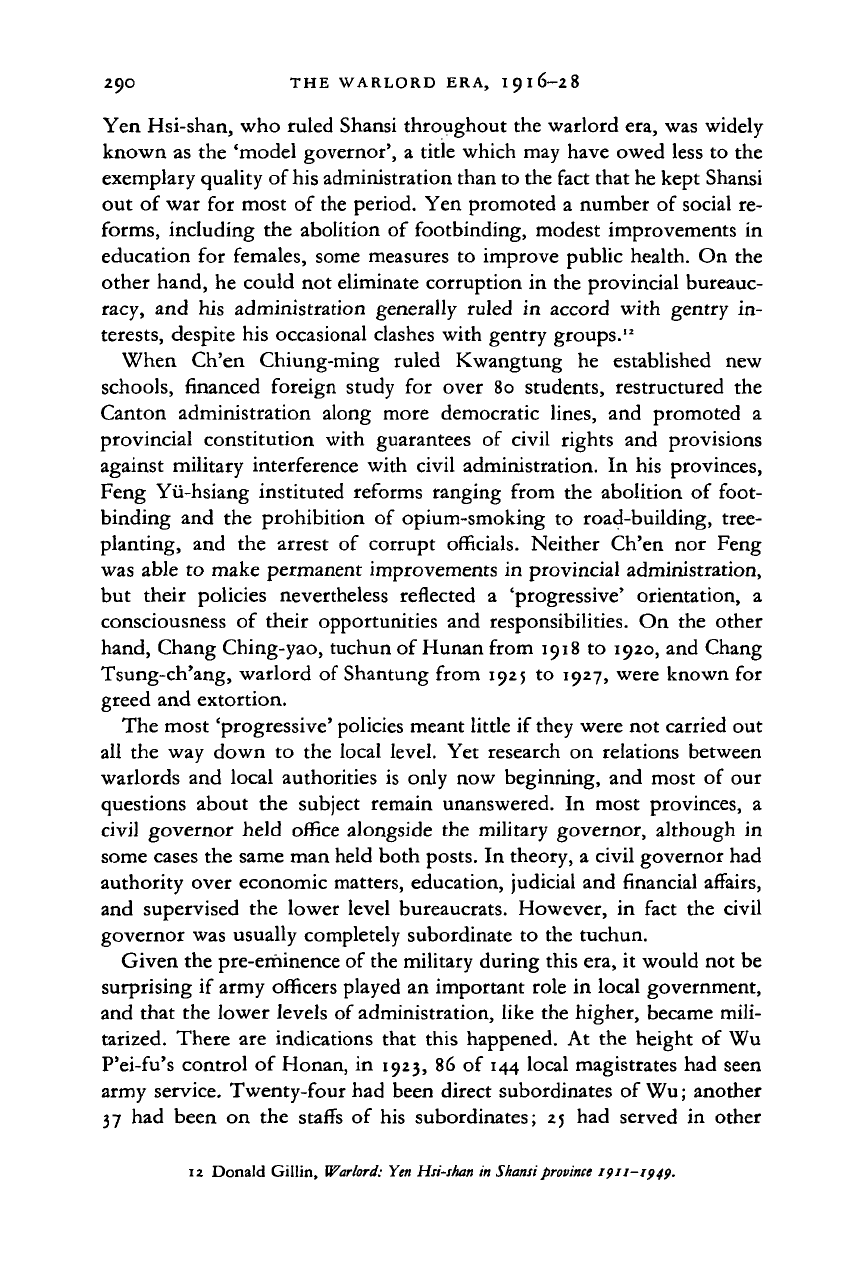
290 THE
WARLORD
ERA, I 9 I 6-2 8
Yen Hsi-shan, who ruled Shansi throughout the warlord era, was widely
known as the 'model governor', a title which may have owed less to the
exemplary quality of
his
administration than to the fact that he kept Shansi
out of war for most of the period. Yen promoted a number of social re-
forms,
including the abolition of footbinding, modest improvements in
education for females, some measures to improve public health. On the
other hand, he could not eliminate corruption in the provincial bureauc-
racy, and his administration generally ruled in accord with gentry in-
terests, despite his occasional clashes with gentry groups.
12
When Ch'en Chiung-ming ruled Kwangtung he established new
schools, financed foreign study for over 80 students, restructured the
Canton administration along more democratic lines, and promoted a
provincial constitution with guarantees of civil rights and provisions
against military interference with civil administration. In his provinces,
Feng Yii-hsiang instituted reforms ranging from the abolition of foot-
binding and the prohibition of opium-smoking to road-building, tree-
planting, and the arrest of corrupt officials. Neither Ch'en nor Feng
was able to make permanent improvements in provincial administration,
but their policies nevertheless reflected a 'progressive' orientation, a
consciousness of their opportunities and responsibilities. On the other
hand, Chang Ching-yao, tuchun of Hunan from 1918 to 1920, and Chang
Tsung-ch'ang, warlord of Shantung from 1925 to 1927, were known for
greed and extortion.
The most 'progressive' policies meant little if they were not carried out
all the way down to the local level. Yet research on relations between
warlords and local authorities is only now beginning, and most of our
questions about the subject remain unanswered. In most provinces, a
civil governor held office alongside the military governor, although in
some cases the same man held both posts. In theory, a civil governor had
authority over economic matters, education, judicial and financial affairs,
and supervised the lower level bureaucrats. However, in fact the civil
governor was usually completely subordinate to the tuchun.
Given the pre-eminence of the military during this era, it would not be
surprising if army officers played an important role in local government,
and that the lower levels of administration, like the higher, became mili-
tarized. There are indications that this happened. At the height of Wu
P'ei-fu's control of Honan, in 1923, 86 of 144 local magistrates had seen
army service. Twenty-four had been direct subordinates of Wu; another
37 had been on the staffs of his subordinates; 25 had served in other
12 Donald Gillin, Warlord: Yen Hsi-shan in
Shansi province
Cambridge Histories Online © Cambridge University Press, 2008
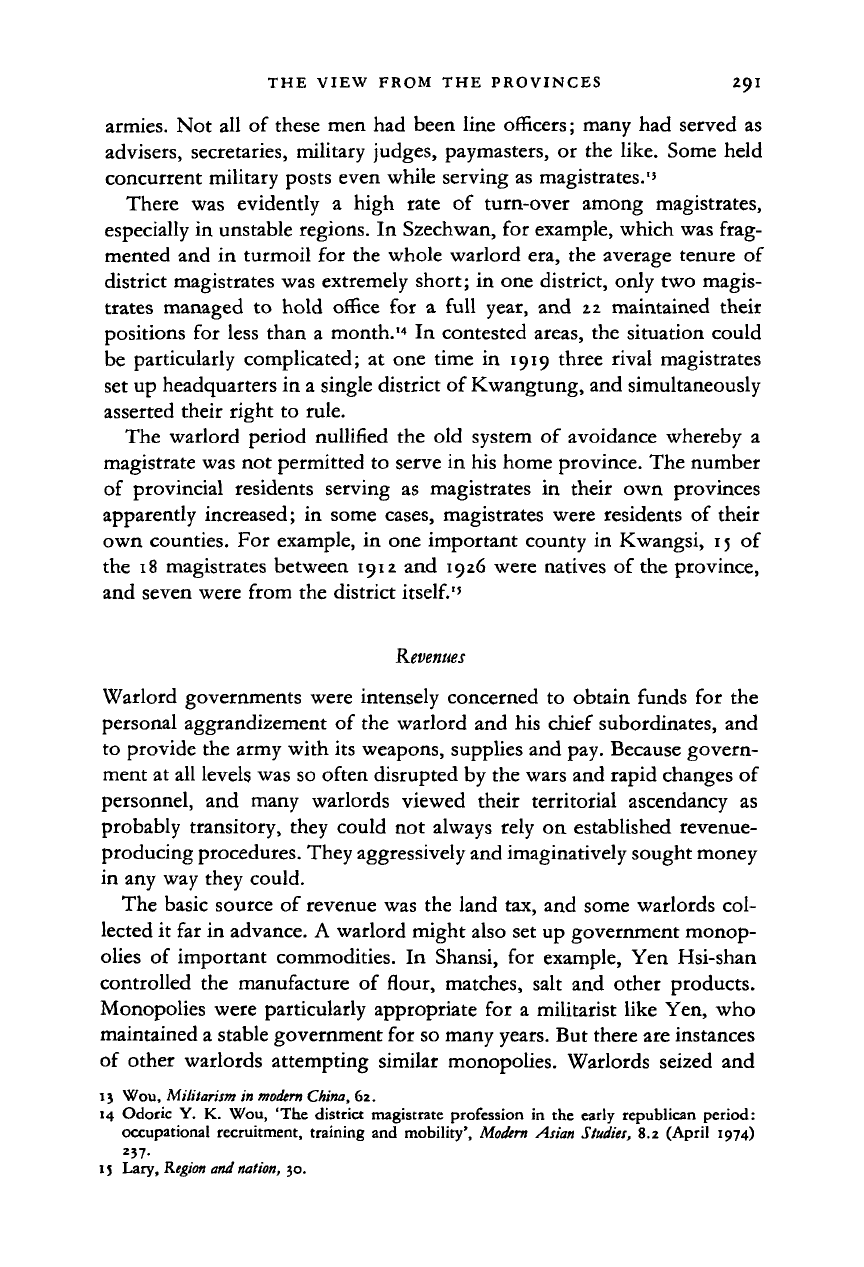
THE VIEW FROM THE PROVINCES 291
armies. Not all of these men had been line officers; many had served as
advisers, secretaries, military judges, paymasters, or the like. Some held
concurrent military posts even while serving as magistrates.'
5
There was evidently a high rate of turn-over among magistrates,
especially in unstable regions. In Szechwan, for example, which was frag-
mented and in turmoil for the whole warlord era, the average tenure of
district magistrates was extremely short; in one district, only two magis-
trates managed to hold office for a full year, and 22 maintained their
positions for less than a month.'
4
In contested areas, the situation could
be particularly complicated; at one time in 1919 three rival magistrates
set up headquarters in a single district of Kwangtung, and simultaneously
asserted their right to rule.
The warlord period nullified the old system of avoidance whereby a
magistrate was not permitted to serve in his home province. The number
of provincial residents serving as magistrates in their own provinces
apparently increased; in some cases, magistrates were residents of their
own counties. For example, in one important county in Kwangsi, 15 of
the 18 magistrates between 1912 and 1926 were natives of the province,
and seven were from the district
itself.
1
'
Revenues
Warlord governments were intensely concerned to obtain funds for the
personal aggrandizement of the warlord and his chief subordinates, and
to provide the army with its weapons, supplies and pay. Because govern-
ment at all levels was so often disrupted by the wars and rapid changes of
personnel, and many warlords viewed their territorial ascendancy as
probably transitory, they could not always rely on established revenue-
producing procedures. They aggressively and imaginatively sought money
in any way they could.
The basic source of revenue was the land tax, and some warlords col-
lected it far in advance. A warlord might also set up government monop-
olies of important commodities. In Shansi, for example, Yen Hsi-shan
controlled the manufacture of flour, matches, salt and other products.
Monopolies were particularly appropriate for a militarist like Yen, who
maintained a stable government for so many years. But there are instances
of other warlords attempting similar monopolies. Warlords seized and
13 Wou, Militarism in
modem
China, 62.
14 Odoric Y. K. Wou, 'The district magistrate profession in the early republican period:
occupational recruitment, training and mobility', Modern Asian Studies, 8.2 (April 1974)
2
37-
15
Lary, Region and nation,
30.
Cambridge Histories Online © Cambridge University Press, 2008
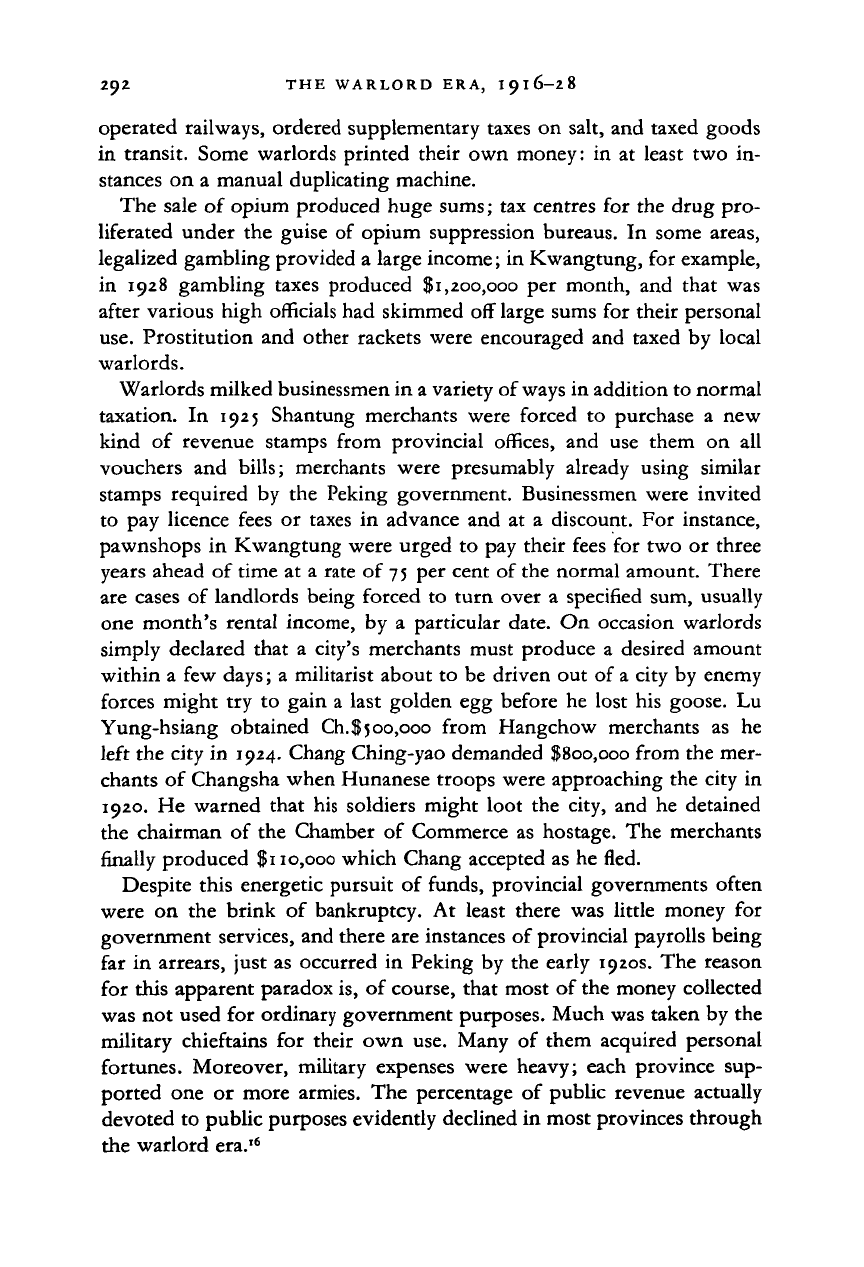
292 THE WARLORD ERA, I 9 I 6-2 8
operated railways, ordered supplementary taxes on salt, and taxed goods
in transit. Some warlords printed their own money: in at least two in-
stances on a manual duplicating machine.
The sale of opium produced huge sums; tax centres for the drug pro-
liferated under the guise of opium suppression bureaus. In some areas,
legalized gambling provided a large income; in Kwangtung, for example,
in 1928 gambling taxes produced Si,200,000 per month, and that was
after various high officials had skimmed off large sums for their personal
use.
Prostitution and other rackets were encouraged and taxed by local
warlords.
Warlords milked businessmen in a variety of
ways
in addition to normal
taxation. In 1925 Shantung merchants were forced to purchase a new
kind of revenue stamps from provincial offices, and use them on all
vouchers and bills; merchants were presumably already using similar
stamps required by the Peking government. Businessmen were invited
to pay licence fees or taxes in advance and at a discount. For instance,
pawnshops in Kwangtung were urged to pay their fees for two or three
years ahead of time at a rate of 7 5 per cent of the normal amount. There
are cases of landlords being forced to turn over a specified sum, usually
one month's rental income, by a particular date. On occasion warlords
simply declared that a city's merchants must produce a desired amount
within a few days; a militarist about to be driven out of a city by enemy
forces might try to gain a last golden egg before he lost his goose. Lu
Yung-hsiang obtained Ch.$
5 00,000
from Hangchow merchants as he
left the city in 1924. Chang Ching-yao demanded $800,000 from the mer-
chants of Changsha when Hunanese troops were approaching the city in
1920.
He warned that his soldiers might loot the city, and he detained
the chairman of the Chamber of Commerce as hostage. The merchants
finally produced Si 10,000 which Chang accepted as he fled.
Despite this energetic pursuit of funds, provincial governments often
were on the brink of bankruptcy. At least there was little money for
government services, and there are instances of provincial payrolls being
far in arrears, just as occurred in Peking by the early 1920s. The reason
for this apparent paradox is, of course, that most of the money collected
was not used for ordinary government purposes. Much was taken by the
military chieftains for their own use. Many of them acquired personal
fortunes. Moreover, military expenses were heavy; each province sup-
ported one or more armies. The percentage of public revenue actually
devoted to public purposes evidently declined in most provinces through
the warlord era.
16
Cambridge Histories Online © Cambridge University Press, 2008
